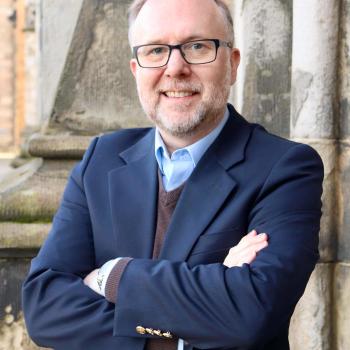So, central to my vision of a new kind of Christianity is the realization that my primary call to my neighbor of another religion is to love him or her as myself. Not terribly radical, I know, but surprisingly rare! This is especially important at our moment in history, it seems to me, because Jesus called us to be peacemakers, and God knows we need more peacemakers across religious boundaries. Not only that, but Jesus called us to follow his example, and he was always "transgressing" religious boundaries by befriending and serving and breaking bread with people outside the circle of "us," whether it was a Syrophoenician woman or a Roman centurion. The apostles followed the same pattern, always breaking boundaries and connecting with people they formerly would have avoided. So one of my life mottoes is, "A follower of Jesus moves toward the other in love and compassion." Inter-religious friendship is not a compromise of my commitment to Jesus; it's an expression of it!
What can mainline Protestants and evangelicals learn from each other? And how can we be in conversation with each other when we're so often polarized over specific issues?
So many things, but let me mention just two things on each side. Mainliners can learn that it's not a sin to share their faith, to be so enthusiastic about what God is doing in their lives and churches that when Monday morning comes and a coworker says, "How was your weekend?" they say, "Fantastic. Probably the highlight was the church service I was part of yesterday. If you'd ever like to come with me, I'd love you to come." And evangelicals can learn that the ethics of the kingdom of God are not equivalent to the platform of the Republican Party or the American government -- which many evangelicals are beginning to realize, but surprisingly high numbers seem not to.
Mainliners can learn that institutional involvement isn't the same as personal conversion and commitment, and they can learn to challenge people, especially young people, to radical, personal commitment. They can learn that conversion and discipleship aren't accidental; they require intentionality. And evangelicals can learn that literalism isn't actually the most respectful approach to scripture, and that thoughtful mainline scholarship can enrich their understanding of the Bible in ways they've never imagined.
You recently lead a group of Christians on a pilgrimage to Palestine. What new insights did you glean from that trip? What are the essential questions we need to be asking there?
First, things were far worse than I had expected. We need solutions that are pro-Israeli, pro-Palestinian, and pro-peace and pro-justice. But what's going on now is anti-Palestinian, anti-peace, anti-justice, and sadly, it will only turn global opinion more strongly against Israel as the truth becomes known. Second, I understood more clearly that the status quo continues because the U.S. lets it continue, and the U.S. lets it continue largely because Israeli lobbyists have effectively won over Christian Zionists in the U.S. to support the status quo. We Christians are far more deeply complicit in the situation than I previously realized. Third, I was struck by how few Americans realize the vital role that Christian Palestinians are playing in the work of peace. It would sure be nice if American Christians would show more solidarity to their Christian sisters and brothers in Palestine!
Here's are a series of questions I wish that Christians in America would ask: how did Christians through history treat Jews? What were our techniques of discrimination, oppression, and exclusion against Jews? How did we justify our behavior? Have we adequately acknowledged, confessed, and repented of those behaviors? If not, how can we ask the Israelis to stop doing to Palestinians in the 21st-century what we did to Jews for so many centuries? Might our humility and repentance be a catalyst for a change of heart and behavior among Israelis?
You criticize the church's historical "fundasexuality." What do you think ought to be the relationship of the Christian church toward homosexuals?
I love the statement Desmond Tutu just issued about homosexuality. His experience under racial apartheid in South Africa has sensitized him to other kinds of separation and discrimination, including discrimination against gay people. But at the same time, I know that many people, including dear friends and family members, will never choose Tutu's path. They are committed to a certain way of reading the Bible that won't allow them to change their view, and they are deeply involved in religious communities that won't allow them to even consider another way of seeing the issue without facing excommunication and so on. So what this means is that those of us who feel that gay people are being mistreated must be willing to receive the same treatment that gay people receive. That's solidarity. And that's not easy. But working for change has never been easy.





